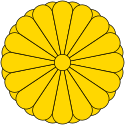| This article is part of a series on |
 |
|---|
|
|
The Ministries of Japan (中央省庁, Chūō shōchō, Central ministries and agencies) or Government Agencies of Japan (行政機関, Gyōsei kikan, Public administration organizations) are the most influential part of the executive branch of the Government of Japan. Each ministry is headed by a Minister of State appointed by the Prime Minister. In postwar politics, the posts of ministers have been given to senior legislators, mostly of the LDP. However, few ministers serve for more than one or two years to develop the necessary grasp of the organisation to become really influential. Thus, most of the power lies within the ministries, with the senior bureaucrats.
The current 15 Cabinet-level ministries of the Government of Japan include:
- the Cabinet Office (内閣府, Naikaku-fu)
- 1 Cabinet-level commission (委員会, īnkai)
- 2 Cabinet-level agencies (官庁, kanchō)
- 11 ministries (省, shō)
The Board of Audit of Japan is responsible for ensuring the adequacy of the Government's financial management by continuously auditing and supervising government activities, and verifying expenditures and revenues of the state.[1]
- ^ "Aims of the Audit|Audit Activities|Board of Audit of Japan". jbaudit.go.jp. Retrieved 14 September 2022.